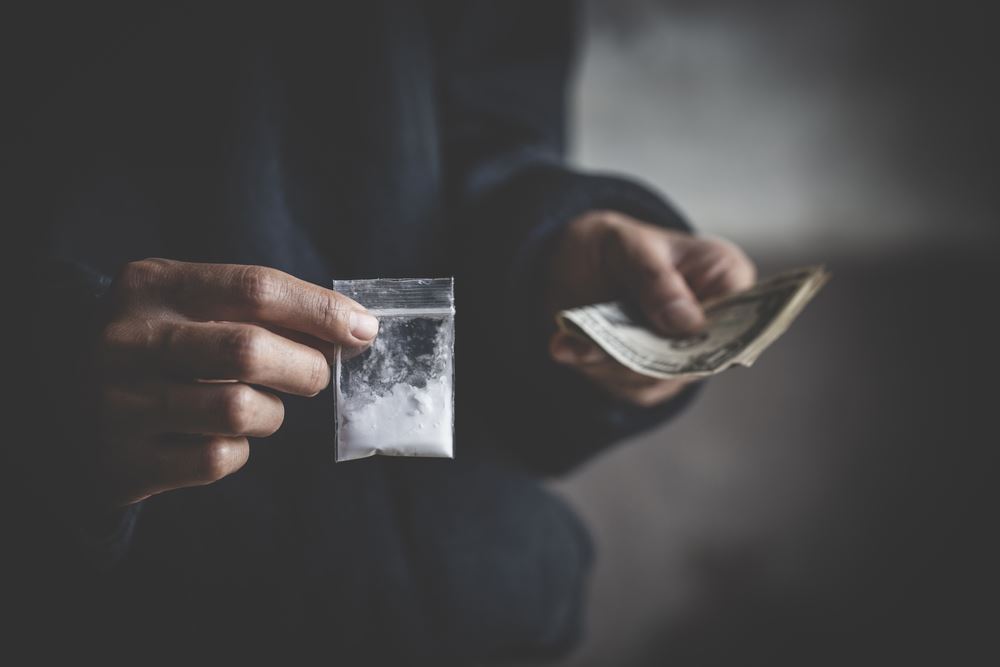Many states across the U.S. have relaxed their laws against drug possession, though Ohio is not one of them. It maintains strict laws against possessing controlled substances, including marijuana possession without a medical card.
Law enforcement continues to arrest people every day for alleged drug possession, and prosecutors issue criminal charges of varying degrees. Depending on the circumstances, drug possession can result in a misdemeanor or felony charge, and the penalties can also vary widely from case to case.
One thing that every defendant facing possession charges has in common is that they should immediately hire a drug crime defense lawyer.
A criminal conviction for drug possession can result in serious penalties, including costly fines and significant jail time in some situations. If a police officer recently arrested you on a drug possession charge, you must understand your legal rights and hire an experienced criminal defense attorney to represent you at every stage of the proceedings.
Never underestimate drug possession charges. Seek professional defense assistance the first thing after an arrest to protect your future.
What is Drug Possession in Ohio?
Ohio recognizes two different types of drug possession. The first type of possession is actual possession, where an individual has physical control over the substance. For example, a police officer may find a controlled substance on the individual’s person.
Constructive possession, on the other hand, is significantly more difficult for a state prosecutor to prove. For a person to be in constructive possession of a drug, they must normally have immediate access to the drug and know of its existence.
In addition to a drug possession charge, an individual may face other related criminal charges.
Those charges may include:
- Illegally manufacturing drugs
- Drug trafficking
- Illegal possession or use of drug paraphernalia
- Possessing drug abuse instruments
- Corrupting another individual with drugs
If you are currently facing any of these criminal drug charges, you need to seek the legal help you need immediately. A defense attorney can immediately begin investigating your arrest and criminal charges. They can then develop a strong legal defense to your pending charge and represent you at all legal hearings in your case.
Potential Penalties for a Drug Possession Conviction
All criminal charges come with potential penalties for a conviction. Less serious charges can result in fines and probation, while more severe charges can lead to imprisonment.
No matter what penalties you face, remember that a drug conviction will go on your permanent record, which can have major effects on your future, even if you only paid a fine.

The potential penalties for a drug possession conviction will depend on many factors, including:
- The amount of the drug you allegedly possessed
- The location where you reportedly had the drug
- The type of drug that you allegedly possessed
- Whether you have prior drug-related convictions on your record
To even be subject to criminal penalties, the state prosecutor handling your drug charge has to prove their case beyond a reasonable doubt. We can introduce one or more legal defenses to hinder the prosecutor from fully satisfying this extremely high burden. However, if the court convicts you on your criminal drug charge, a judge will sentence you at a hearing.
One crucial factor determining the penalties for a conviction is the type of drug the state alleges you possessed.
Marijuana Possession
Ohio only legalizes marijuana for medicinal purposes. In addition, the individual who possesses the marijuana needs a valid medical marijuana card, and they must have a particular medical condition causing chronic pain, traumatic brain injuries, or post-traumatic stress disorder (PTSD). Moreover, medical marijuana patients may not smoke marijuana, although they may vape it. The only legal medical marijuana products in Ohio are plant materials, oils, patches, tinctures, and edibles.
In cases where an individual unlawfully possessed marijuana, they may face severe penalties, depending on the amount they allegedly possessed.
Some potential penalties include:
- Possession of less than 100 grams of marijuana can lead to a maximum monetary fine of $150.
- Possession of between 100 and 200 grams of marijuana can lead to a maximum of 30 days of incarceration and a $250 fine.
- Possession of between 200 and 1000 grams of marijuana can result in a maximum of one year of incarceration and a maximum monetary fine of $2,500.
- Possession of between 1000 and 2000 grams of marijuana can lead to a maximum three-year prison sentence, along with a maximum monetary fine of $10,000.
- Possessing between 20,000 and 40,000 grams of marijuana is a felony offense and can lead to mandatory jail time of five, six, seven, or eight years.
- Finally, possessing more than 40,000 grams of marijuana is a second-degree felony and can result in a required eight-year prison term.
Possession of Other Controlled Substances
Another common drug that individuals possess in Ohio is heroin.
Heroin is also a Schedule I drug under the Ohio Criminal Code, and the criminal drug charges that an individual receives depend on the amount of the drug they allegedly possessed.
- Possessing less than one gram can result in a prison sentence of six to 12 months.
- Possessing one to four grams can result in a prison sentence of six to 18 months.
- Possessing between five and nine grams can lead to a three-year prison sentence.
- Possessing between 10 and 49 grams can result in a two to eight-year prison sentence.
- Possessing between 50 and 249 grams can lead to first-degree felony charges and a prison sentence of three to ten years.
- Finally, possessing more than 250 grams is a major drug offense (MDO) in Ohio and can result in an 11-year required period of incarceration.
Unlike heroin, cocaine is a Schedule II drug in Ohio, and individuals who possess that drug can receive anywhere from a first-degree to a fifth-degree felony charge.
- If the individual possesses under five grams, they can receive a maximum monetary fine of $2,500 and six and 12 months of incarceration.
- If they possess between five and nine grams, they can receive a monetary fine of up to $5,000 and between six and 18 months of incarceration.
- If the individual possesses between 10 and 19 grams, they can receive a maximum monetary fine of $10,000, along with nine to 36 months of incarceration.
- If they possess between 20 and 27 grams, they can receive a maximum monetary fine of $15,000 and between two and eight years of prison time.
- Possessing between 27 and 99 grams can lead to a maximum monetary fine of $20,000 and an incarceration period of between three and 11 years.
- Finally, if the individual possesses more than 100 grams, they can receive monetary fines of up to $20,000 and 11 years in jail.
Fentanyl is also a Schedule II drug in Ohio, and the charges depend on the bulk amount that an individual allegedly possessed. Depending on the amount, an individual can receive between six and 11 months of incarceration and monetary fines of up to $20,000.
Finally, an individual who possesses methamphetamines can receive both monetary fines and jail time.
- If they possess less than three grams, they can receive between six and 12 months in jail and a maximum of $2500 in monetary vines.
- If they possess between three and 15 grams, they can receive between nine and 36 months of incarceration and a maximum monetary fine of $10,000.
- If they possess between 15 and 150 grams, they can receive between two and eight years of incarceration and a maximum monetary fine of $15,000.
- If they possess between 150 and 300 grams, they can be subject to first-degree felony charges, a prison sentence of between three and 11 years, and a maximum monetary fine of $20,000.
- Finally, if they have more than 300 grams, they can receive a maximum monetary fine of $20,000, 11 years in prison and major drug offender (MDO) status.
In addition to these potential penalties for a conviction, a convicted drug offender may experience several collateral consequences.
Those consequences may include:
- Difficulty finding or keeping a job, especially if they must operate a motor vehicle as part of their employment
- Difficulty finding a place to live (such as at an apartment complex)
- Difficulty gaining admission to an educational program, including admission to a college, university, or vocational school
- Loss of scholarship funding or financial aid from a college or university
- Harm to one’s professional and personal reputation in the community
If you ultimately receive a criminal conviction on one of these drug possession charges, your defense lawyer can represent you at your sentencing hearing and argue for a fair penalty. They can also work to lessen or eliminate potential collateral consequences you might experience due to your criminal conviction for drug possession.
Possible Defenses to Drug Possession Charges
By raising a strong legal defense to a criminal drug possession charge, you can often prevent the state prosecutor from establishing the legal elements of your case. As a result, your entire case might be subject to a complete dismissal or reduced to a lesser charge. Presenting a legal defense in court is no easy task, and you should never begin this process without the right defense representation.
Your criminal defense attorney can help determine which defense(s) may apply to your case’s specific facts and circumstances.
Some of the most common legal defenses to a drug possession charge include:
- Lack of knowledge as to the drug’s existence in a particular location, such as a home or motor vehicle
- Lack of control over the drug in question
- Fourth Amendment constitutional violations, such as where a police officer initiates an invalid traffic stop, and the officer subsequently finds drugs in the vehicle
- Fifth-amendment constitutional violations, such as where a police officer arrests an individual for drug possession, the arrestee invokes their Miranda rights, but the police officer continues to ask them questions.
Your lawyer can determine if you may be eligible to raise one or more of these legal defenses at your criminal court trial. If so, they can argue the applicable defense on your behalf and work to secure a complete dismissal of your drug possession case whenever possible. Many people are shocked when their charges simply go away because their attorney skillfully presented certain defenses or evidence to the court.
Negotiating a Favorable Plea Deal with the State Prosecutor in Your Case
A case dismissal is not always possible. However, your defense attorney can negotiate a favorable plea deal with the state prosecutor handling your drug possession case. As part of a plea deal, the prosecutor typically agrees to a period of probation or a reduced charge (such as reducing a felony down to a misdemeanor) in exchange for a guilty plea from the accused person.
Your attorney can advise whether it makes sense to accept a pending plea deal from the state prosecutor, take your case to trial, and raise a defense to your drug possession charge.

Steps to Take after an Arrest
Following a criminal arrest on a drug possession charge, there are certain steps that you should take.
Those steps include:
- Invoking your right to remain silent and seek defense counsel during any police questioning
- Meeting with an experienced criminal defense attorney as soon as possible
- Retaining copies of any police reports, citations, and charging documents that you receive
Never answer police questions without an attorney present. Instead, call a drug defense attorney near you immediately. They will tell you what to do and not do to protect your rights and future in the face of drug possession charges.
Your lawyer can immediately investigate the circumstances of your arrest and begin building a strong defense strategy. They will handle the criminal process for you, always seeking the most favorable outcome possible in your case.


